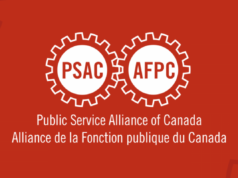CIU National President Mark Weber sent the following letter to the Prime Minister of Canada, as well as the President of the Treasury Board, the Minister of Public Safety, and the Minister of Employment, Workforce Development and Labour, on January 15, 2025.
Dear Prime Minister and Ministers,
On June 13, 2024, the Government of Canada, through the Treasury Board of Canada, committed to expanding early retirement eligibility under the Public Service Pension Plan for frontline public service safety and security workers, including border officers. This was followed in the fall of 2024 by the inclusion of proposed legislative action in the Fall Economic Statement [1] to amend the Public Service Superannuation Act to that effect. Treasury Board also reiterated the federal government’s commitment on December 18, 2024, highlighting that such “early retirement measures recognize the demanding and critical roles of frontline safety and security public servants.”
As National President of the union representing Canada’s border security personnel, I am writing to you today to express how important the expansion of early retirement eligibility is for our members, and to share my deep concern regarding the future of these much-needed legislative changes considering the prorogation of Parliament on January 6.
Border officers are an intrinsic part of Canada’s public safety infrastructure yet currently do not benefit from a retirement regime consistent with other law enforcement officers in the federal public service. The Customs and Immigration Union (CIU) has long advocated for equitable retirement benefits for Canada Border Services Agency (CBSA) officers. Our members work in demanding roles and face similar physical risks as other law enforcement officers. Early retirement without penalty would allow employees who have worked for 25 years and have difficulty maintaining physical standards the opportunity to retire with dignity.
At a time when border services are in dire need of more personnel, these measures would also help CBSA attract new employees by providing benefits comparable to those of other law enforcement agencies.
The June 13 announcement by Treasury Board along with the inclusion of proposed legislative changes in the Fall Economic Statement were therefore extremely well-received by our membership, as it signaled a real understanding by the current government of our members’ needs. Canada’s border personnel are dedicated to protecting our communities by intercepting dangerous drugs and firearms, and the expansion of early retirement eligibility is a welcome recognition of this crucial role.
In light of the above and considering the current political landscape, with prorogation in effect, I urge you to consider alternate means — such as via an Order-in-Council or other appropriate methods — to implement the required changes to fulfill your government’s commitment and expand retirement provisions for frontline public safety workers at the earliest opportunity. Doing so would send a strong signal that this government takes to heart the well-being of its frontline public safety personnel. Your government is to be commended for the work it has done so far to bring this initiative forward, and it would make sense for this same government to be the one to implement these highly anticipated measures.
I remain at your disposal should you wish to discuss this matter in person, and I look forward to your response.
Yours truly,
Mark Weber
National President
Click here for the PDF version of this letter.
[1] Fall Economic Statement, Annex 3, p. 230: “In FES 2024, the government proposes to amend the Public Service Superannuation Act to extend the operational service early retirement program to additional frontline employee groups in the federal public service, as announced by the President of the Treasury Board in June 2024. This special retirement benefit will allow firefighters, border services officers, parliamentary protection officers, and other frontline employees to retire earlier with an immediate unreduced pension after completing 25 years of actual operational service, or at age 50 with 25 years of actual and deemed operational service combined (at least 10 years of actual), as is presently available to employees of Correctional Service Canada working in a federal correctional institution. The proposed amendments would also ensure consistency in treatment for all eligible employees, allowing for career mobility within the public service.





